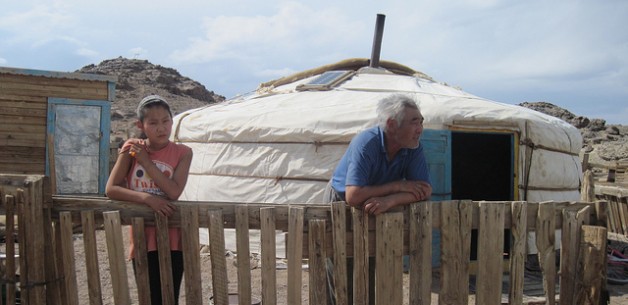A father and daughter resettled by the Oyu Tolgoi mine in Mongolia
Original image by flickr user CEE Bankwatch Network (Creative Commons BY-NC-SA 2.0)
Group of Mongolian herder households files complaint with Meg Taylor, the Vice President of the IFC and MIGA’s accountability mechanism, the Compliance Advisor/Ombudsman (“CAO”), at the World Bank’s Annual Meetings in Tokyo.
Tokyo, Japan, October 12, 2012 – Today, a group of Mongolian herder households filed a complaint demanding just compensation for the impacts of Rio Tinto’s Oyu Tolgoi copper and gold mine and its associated facilities (“OT Project”), located in the South Gobi desert. Despite the OT Project’s numerous problems, the World Bank’s International Finance Corporation (“IFC”) and Multilateral Insurance Guarantee Agency (“MIGA”) are considering a financing package of US$900 million in loans and up to US$1 billion in political risk insurance. The herders’ representative Sukhgerel Dugersuren, Executive Director of the Mongolian organization OT Watch, personally delivered the herders’ complaint to Meg Taylor, the Vice President of the IFC and MIGA’s accountability mechanism, the Compliance Advisor/Ombudsman (“CAO”), at the World Bank’s Annual Meetings in Tokyo.
Mongolia’s nomadic herders, who have practiced their traditional lifestyle in the South Gobi desert for centuries, are finding their way of life threatened by the OT Project. Herders forced to resettle because of the Project have experienced devastating herd loss. “The herders were forced to move to inferior locations without adequate time to select spots that would protect their animals from harsh winter storms,” explains Sukhgerel. “The minimal assistance provided at the time of resettlement was not sufficient. Since being relocated, at least one household lost all of its animals, and several others had to purchase additional livestock to continue herding.”
Herders identify themselves as indigenous to the area, with historical claim to traditional pasture rights and other protections; however, neither Rio Tinto nor the World Bank has recognized them as such. “The herders were denied the right to free, prior and informed consent regarding the OT Project, a right guaranteed under the IFC’s policies on indigenous people,” states Jelson Garcia of the Bank Information Center. “Although true free, prior and informed consent is no longer possible, considering that construction is nearly complete, the World Bank must recognize the herders’ rights and should not consider supporting the OT Project until herders are justly compensated for all of their livelihood and cultural losses.”
Herders are currently being coerced into accepting low levels of compensation based on their location in proximity to the OT Project, rather than the size of pasture taken away from them. According to Sukhgerel, “Rio Tinto is manipulating herders into signing biased and unfair compensation contracts, telling them that they are the only ones left yet to sign, that they will be left with nothing if they do not accept the terms as is, or even just pressuring them to sign without reading or understanding the contract.”
The herders filing the complaint are concerned that the compensation being offered does not take into account the fact that safe and undisturbed access to sufficient water and high quality pasture is essential to maintaining their herding businesses, as well as their traditional culture and way of life. “We do not need gold or money, but water and land to live,” declares L. Battsengel, Director of the herder organization Gobi Soil, which herders formed to fight against the destruction of their way of life by large-scale mining projects and related infrastructure development.
“After many unsuccessful attempts to negotiate directly with Rio Tinto to secure just compensation for all livelihood and cultural losses, the herders have turned to the CAO for assistance,” explains Sarah Singh of Accountability Counsel. “The herders hope that the CAO process will lead to a fair compensation contract, as well as long-term solutions for herders who are no longer able to continue their traditional lifestyle.”
For more information, please contact:
Sukhgerel Dugersuren, Executive Director, OT Watch, +976 99 185 828,otwatch@gmail.com
Jelson Garcia, Bank Information Center, +1 202 624 0622, jgarcia@bicusa.org
Sarah McNeal, Bank Information Center, +1 202 624 0622, smcneal@bicusa.org
Richard Harkinson, London Mining Network, +44 7563 238179,research@londonminingnetwork.org
Vladlena Martsynkevych, CEE Bankwatch Network, +380 44 353 78 42,vladlena@bankwatch.org
Regine Richter, Urgewald, +49 3028482270, regine@urgewald.de
Sarah Singh, Accountability Counsel, +1 415 296 6761,sarah@accountabilitycounsel.org

